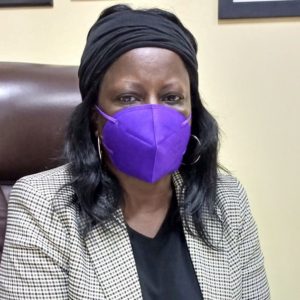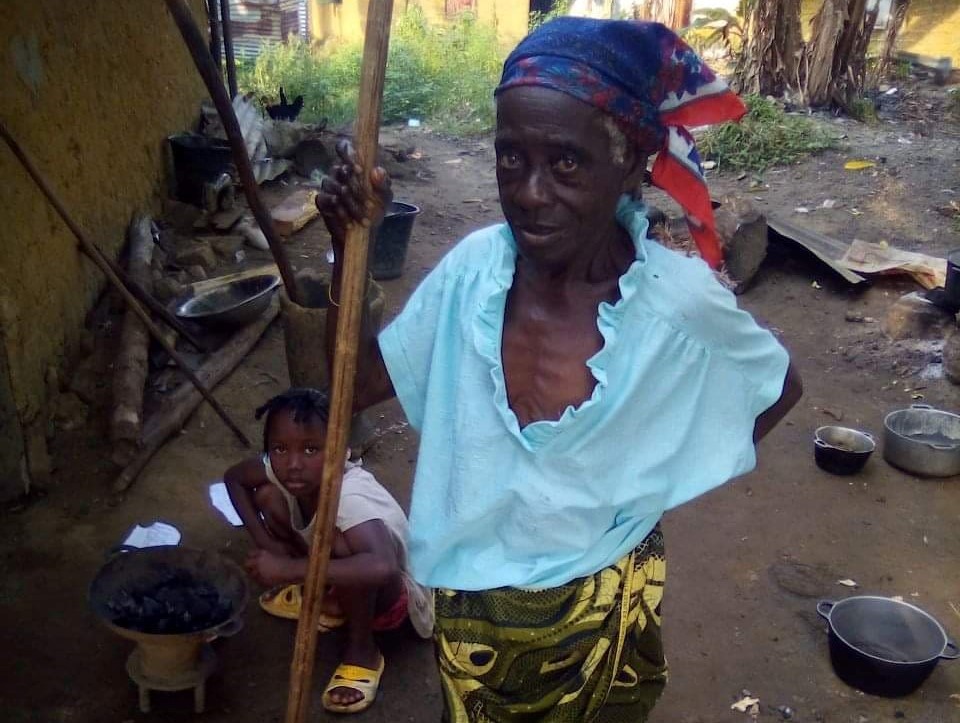PHOTO: One of the victims of Infertility stigma, Madam Elizabeth Chea
By Garmah Never Lomo, garmahlomo@gmail.com
In Liberian society, as in almost every African setting, barrenness can become a real nightmare for women.
Ignorantly, most often, failures of unions to produce children are blamed entirely on women – a situation that’s accompanied by stigmatization, name calling, and other discriminatory treatments. Cruel behaviors meted out to such women often force them into withdrawal and in extreme conditions, even into isolation.
A typical case in point relates to a 74-year-old woman living in the southeastern region of Liberia, who was tacitly forced to quit her marriage of more than 30 years. This was simply because she could not bear a child.
Elizabeth Chea of Klowehn Digbe River District, Sinoe County, could no longer withstand the stigma and other ills she suffered because of her condition.
The ultimate option for her was to abandon the marriage and seek solution to her condition. She sought answers from both medical and spiritual sources, but nothing seemed to have worked for her.
Elizabeth Chea’s experience from the previous marriage, she said, made her skeptical of entering another relationship. She therefore stayed alone as she sought solutions to her problem.
After several years, she entered another relationship. Aware of her infertility condition which had spanned decades, Madam Chea encouraged her new husband to bring in another woman to bear children for him, as often done in most cultures in Africa.
This new-found mate later became a thorn in her flesh, Chea said. This mate, to Chea’s dismay and disappointment, would literally mock her and throw demeaning and unkind words at her.
Chea’s only response, as always, was to withdraw herself into her room and cry out to God and ask Him why would He allow this to happen to her (Chea). Added to that, the husband died and everyone went their separate ways.
After all of the disgrace and misfortune she endured, kind family members in solidarity with her, gave her children to raise as her own and to keep her company.
At 74, she currently lives with one of those she adopted (Oretha Grant) in Greenville, Sinoe County. In Greenville, Chea is involved with petite fish selling out of which she is able to raise some extra cash for herself.
The case of Elizabeth Chea is simply a snapshot or a tip of the ice berg, when it comes to unjust treatments women considered to br infertile go through in Liberian society.
Senator describes infertility stigma as worrisome
Among key public officials concerned about their plight is Grand Bassa County Senator Nyonblee Karngar Lawrence.

Sen. Kangar-Lawrence
She said stigmatizing women simply because they have not been able to bring forth children is a serious societal issue that should claim the attention of everyone.
Speaking to www.newspublictrust.com from her Capitol Building office, Sen. Lawrence said this is a disturbing and worrisome situation that has sometimes led to affected women attempting suicide especially in marriages.
She has at the same time said that despite all of that, she has not heard much awareness on Infertility Stigma and they as lawmakers ought to advocate in the best interest of citizens.
The Grand Bassa County Senator also said that they as legislators could propose programs against stigmatization if there were reports from different sources highlighting the gravity of the situation.
She further said she will have conversation with the Health and Gender Ministries to inquire “whether there is any program or plan against infertility stigma”.
Sen. Karngar-Lawrence said if there is nothing, she could recommend working with some NGOs already involved with the stigmatization campaign to have them incorporated into different sectors through budgetary allotment to make sure that money is made available to some institutions involved with infertility stigma through awareness and other means.
She is also recommending the erection of well equip medical facilities for women in such conditions that need special attention.
On supporting women with infertility, the female lawmaker said people who are infertile can be supported through widespread awareness, town hall meetings, both electric and print media, counselling and adoption of children, among others.
She is therefore encouraging the First Lady’s Office and the Ministries of Health and Gender to collaborate in the fight against stigmatization.
Local NGO weighs in
For his part, the Executive Director of the Legislative Watch Forum (LEWAFO) Jeremiah Paye has said their role as a Civil Society organization is to push legislations to make allotments for reproductive/family planning health to support such public awareness programs, which prevent and reduce infertility.

Jeremiah Paye, head of LWWAFO
“The establishment of national sexuality education programs diagnosis/early treatment of STIs promotion of healthy lifestyles, prevention of unsafe abortion, Support towards quality services of family planning, budgetary support towards reproductive health has been minimal”, Mr. Paye said.
He also wants CSOs to collaborate with relevant partners to conduct a surveys that generate on the infertility/fertility rate in Liberia.
The LEWAFO is also recommending “expert working sessions on developing guidelines on the prevention, diagnosis &treatment of infertility in men and women of Liberia, work with relevant stakeholders, including the Ministry of Health, Legislature, UN Agencies, non-state actors and other partners to strengthen political commitments, availability and capacity of health systems to deliver fertility care Monitoring expenditures towards reproductive health and evaluating impacts”.
Paye outlined some of the impediments to treating infertility in Liberia to several factors including government’s failure to allot resources to address what he terms as inferior treatment, stigma towards infertile persons and discriminatory exclusion of some infertile persons from access to treatment.
In the case of Liberia, poor health system and inadequate training increases incidences of infertility/childlessness, he said. “Therefore, failure to prevent, treat, recognize and respond to infertility and or childlessness, raises human rights concerns/advocacy.
Mr. Paye explained that the issue of infertility is also tied to the right to health, equality & non-discrimination, right to plan and space one’s children, right to privacy and form a family, the right to procreate and reproduce.
He said in light of all of that, advocacy against discrimination against infertile persons is crucial and needed.
The LEWAFO advocacy steps, he said includes being vocal on infertility issues (discrimination and inaccessibility to treatments), pushing for a legislation against denial of fertility treatments to infertile persons, Engage into educational programs to refute fertility myths; press releases, position and policy statements for public information.
Part of it, Paye outlined, also includes carrying out view sampling to relate infertility struggle experiences of affected people and discussing infertility issues on social media (Facebook, Instagram, twitter, etc) using posts and hashtags.
He has also underscored the need to support those affected by infertility by joining a support group, volunteering to lead a peer-led support group like the establishment National Infertility Associations.
“We’re making our voice heard on Capitol Hill (pushing for increased budgetary allotments for fertility treatments, awareness creation, etc. organizing and participating in infertility awareness events like the National Infertility Awareness Week (last week in April); Men’s Health Week (second Week of June); Pregnancy and Infant Loss Remembrance Week (October 15)Applying for support from local and international partners towards infertility advocacy activities.”
Prospects of treating infertility
On the prospects of treating infertility, the County Health Officer (CHO) of Rivercess County, Dr. Joseph Topor said infertility can be looked at from the medical and psychosocial angles.

Rivercess County Health Officer Dr. Joseph Topor
The Liberian Medical Doctor said thorough medical evaluation to detect the cause, followed by treatment if possible, if it’s not treatable, psychosocial counseling can be employed to prepare partners to accept reality and consider other options such as or other solutions. “Gynecologist must be consulted as a first approach to handle issues of Infertility.
“Post infertility care for survivors should be a holistic package and there should be widespread messages of awareness that will sensitize the public on the issue of stigmatization,” Dr. Topor added.
The Rivercess County Health Officer added that psychosocial counseling should be carried out in concert with experts and religious leaders.
“Moreover, family support is important to the victim. There is also need to create a space for children adoption to reduce the level of trauma associated,” Dr. Topor further explained.
According to him, community engagement is key in the intervention against stigma and that it should be clearly understood that infertility in no way means loss of God-given status of being a man or woman.
“It is just fact that everyone is not prepared to bring forth a child due to several medical reasons,” Dr. Topor further explained.
Dr Topor also used the occasion to explain that infertility affects both male and female. He said it is therefore advisable that whenever a couple is faced with difficulties in bringing forth a child, both parties go through medically evaluation.
“It is the responsibility of couples to work as a team when issues of infertility arise. It becomes less of a burden when both parties support the process positively. There are several medical conditions that may lead to infertility in males,” Dr. Topor said.
The Liberian doctor said that most infertility issues can medically be resolved once detected sooner and that it is recommended and profitable for couples seeking to bring forth children to consult gynecologist if issues of infertility are suspecte

